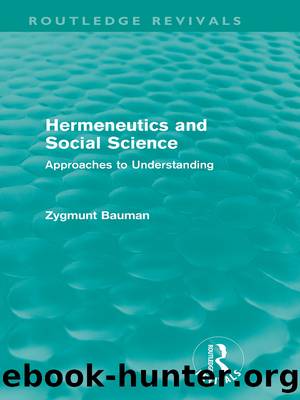Hermeneutics and Social Science (Routledge Revivals) by Zygmunt Bauman

Author:Zygmunt Bauman [Bauman, Zygmunt]
Language: eng
Format: epub
Tags: Social Science, General, Sociology, Philosophy, Social
ISBN: 9781136955532
Google: JH7FBQAAQBAJ
Publisher: Routledge
Published: 2010-03-23T05:41:13+00:00
7
Understanding as the work of life: Martin Heidegger
The driving force of Husserlâs work was his urge to design a foolproof and fully trustworthy method leading to an equally reliable, ultimate interpretation of meaning. In the course of his search Husserl turned away from the mundane, unmethodical and therefore precarious methods which ordinary men and women employ matter-of-factly to sustain and orient their life-in-the-world. Distrustful of such mundane understanding as notoriously ambivalent and volatile, Husserl postulated, as the only remedy, a radical disengagement of the interpreting subject from its wordly entanglements. We traced his efforts to achieve this, and we saw his ultimate failure; the truly radically disengaged subject turned out to be pure consciousness, incapable of returning to the world, much less of coming to grips with the task of understanding in the only form which counts: as it is posited by, and in, life-in-the-world.
Heideggerâs is the earliest and most perceptive criticism of the irrealism of Husserlâs project, voiced well before Husserl himself realized the self-defeating character of his efforts. The decisive departure entailed in Heideggerâs approach to understanding expressed itself in the discovery that understanding is a mode of being, rather than a mode of knowledge; consequently, the mystery of understanding is an ontological, rather than epistemological problem. To Heidegger, the activity of understanding can be grasped solely as an aspect of being, as an essence of existence. As Ricoeur put it, instead of asking what is to be done in order to obtain correct understanding, Heidegger took another question as his major concern: what, in the human mode of being-in-the-world, determines both the possibility and the actuality of understanding?
Heidegger is not, therefore, concerned with a method whichâ once designedâcould be learned and employed by professional hermeneuticians to resolve their conflicts of interpretation. Heidegger has little, if anything, to tell all those who want to know why they ought to prefer one particular interpretation to another. Instead, he painstakingly explores the ontological foundations of the understanding which men and women reach by the very fact of being-in-the-world. This understanding is a necessity, rather than an exceptional achievement; a necessity constantly arising from their very existence, as this existence stubbornly and incessantly reveals to them the variety of possibilities in which they might be-in-the-world. Das Dasein ist seine Erschlossenheit1 (existence is its own disclosure).
This is the central message of Heidegger.
Though Heidegger and his doctrine are rarely quoted as paragons of lucidity, his main idea is clear and unambiguous. Understanding is a problem in the world, and if it can be solved at all, it is to be solved in the world. People do solve it day by day. If their solutions fall somewhat short of the philosophersâ ideal of purity and precision, so much the worse for philosophersâbecause understanding can be found only where it is. If absolute truth and true understanding can be found only in an imaginary, prejudice-free, antiseptic world emancipated from its earthly commitments, there are no such things as absolute truth and full understanding. But then it does not matter much for human understanding to go its course.
Download
This site does not store any files on its server. We only index and link to content provided by other sites. Please contact the content providers to delete copyright contents if any and email us, we'll remove relevant links or contents immediately.
Cecilia; Or, Memoirs of an Heiress — Volume 1 by Fanny Burney(32531)
Cecilia; Or, Memoirs of an Heiress — Volume 2 by Fanny Burney(31929)
Cecilia; Or, Memoirs of an Heiress — Volume 3 by Fanny Burney(31919)
The Great Music City by Andrea Baker(31905)
We're Going to Need More Wine by Gabrielle Union(19022)
All the Missing Girls by Megan Miranda(15898)
Pimp by Iceberg Slim(14468)
Bombshells: Glamour Girls of a Lifetime by Sullivan Steve(14041)
For the Love of Europe by Rick Steves(13831)
Talking to Strangers by Malcolm Gladwell(13334)
Norse Mythology by Gaiman Neil(13320)
Fifty Shades Freed by E L James(13218)
Mindhunter: Inside the FBI's Elite Serial Crime Unit by John E. Douglas & Mark Olshaker(9302)
Crazy Rich Asians by Kevin Kwan(9263)
The Lost Art of Listening by Michael P. Nichols(7482)
Enlightenment Now: The Case for Reason, Science, Humanism, and Progress by Steven Pinker(7292)
The Four Agreements by Don Miguel Ruiz(6731)
Bad Blood by John Carreyrou(6602)
Weapons of Math Destruction by Cathy O'Neil(6250)
